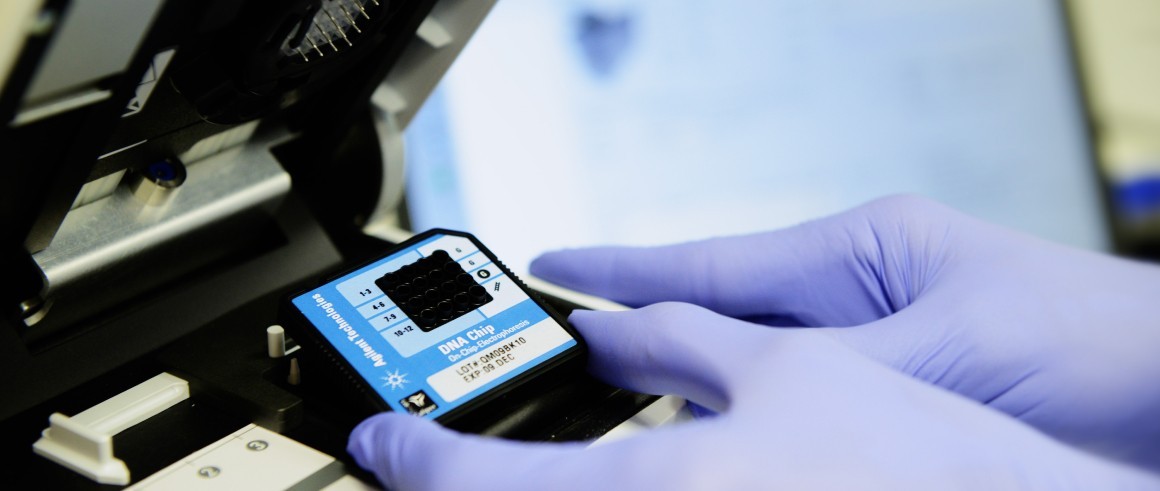Hereditary diseases
Inherited diseases, or genetic diseases, are diseases caused by a change in the structure of individual segments of deoxyribonucleic acid (DNA) – genes, or even larger areas of the DNA molecule. DNA codes the functions of cells of the entire organism and it also predicts all structures and features of any given organism. Some genetic diseases may not be acquired by inheritance, but they may develop de novo as a result of random mutations.
What is Cystic Fibrosis?
Cystic fibrosis is one of the most common severe hereditary diseases in the Caucasian population. The prevalence of the disease in new-borns is 1/6500, corresponding to the population carrier frequency of as much as 1/40. The incidence and subsequent development of this disease are caused by mutations in the CFTR gene. The most common mutation called F508del is involved in the pathogenesis of the vast majority of cases in the Caucasian population. The disease belongs to the so-called autosomal recessive disorders when the affected individual inherits the pathogenic form of the gene mutation form from each of the parents. The parents themselves are asymptomatic carriers and the probability of the disease in the offspring of such parents (carriers) is 1/4, i.e. 25%. Cystic fibrosis is a disease that affects multiple organs. In neonatal age, about 1 in 5 children with cystic fibrosis suffer from bowel obstruction caused by extremely thick meconium.
Another symptom of this disease in the newborn is the prolonged duration of neonatal jaundice. Throughout life, patients suffer from recurrent inflammations of the airways affecting both the upper respiratory tract and the lungs. The accompanying symptom of this disease is a choking cough with coughing up of purulent mucus containing bacteria typical of CF. Gastrointestinal and hepatic disorders are predominant among non-respiratory symptoms. Most men (98%) with cystic fibrosis are infertile. Female infertility is less common, 80% of women may become pregnant and even carry a healthy newborn, however, the delivery is more difficult due to the viscous mucus present in the cervix, which makes it difficult for sperm to pass through to the egg.
About the test
TRISOMY test Complete +Cystic Fibrosis s an additional assessment that can be ordered together with TRISOMY test Complete. The test covers an assessment detecting the most common F508del mutation in the CFTR gene causing Cystic Fibrosis, which is one of the most common severe hereditary diseases.
Test accuracy exceeding 90 %
The probability of a correct result of the +CYSTIC FIBROSIS additional test is higher than 90%. An extensive prospective study is currently underway to determine the positive and negative predictive value of test results. The interim results obtained by analyzing more than 1,000 samples show that both values exceed 90%. In case of issuing a positive result stating a “high risk” of the disease affecting the fetus, the laboratory recommends consulting the result with a clinical specialist in genetics, who will suggest the optimal procedure for confirmation analyzes also in the context of subsequent diagnostic testing of other persons (biological father of the fetus) and further personalization of the corresponding risk.
1:40
The risk of being a carrier of cystic fibrosis gene
25%
The risk of a child inheriting the gene from both parents

What is Smith-Lemli-Opitz syndrome ?
It is a severe hereditary disease with an autosomal recessive type of heredity, in which the affected individual inherits mutations from both biological parents who are asymptomatic carriers and the probability of the disease in the offspring of such carrier parents is 1 : 4, i.e. 25%. The prevalence of the disease in newborns is 1 : 15,000, corresponding to a carrier frequency of up to 1 : 60. The test results in the detection of pregnancies with “low risk” or “high risk” of the fetus being affected by the disease as well as the identification of asymptomatic carriers of this mutation. The clinical manifestations of this disease vary in severity from severe disability to death or fetal miscarriage. Clinical symptoms include cleft palate, syndactyly (most commonly fused fingers include index finger and middle finger), facial dysmorphia (anatomical changes in the newborn’s face), microcephaly (small head), heart, lung, liver, kidney, adrenal, pancreatic and brain malformations.
Prenatal and postnatal growth retardation (slowed growth), and mental disability are also common. Men with this disease may suffer from genital abnormalities – incomplete formation of the urethra. Individuals affected by the disease also experience a wide range of behavioral abnormalities (autism, aggression, hyperactivity, frequent mood swings, anger outbursts, self-harm, mental retardation or delayed speech development). Other manifestations include inadequate production of steroid hormones, bile acids with subsequent low absorption of fats and fat-soluble vitamins.
About the test
TRISOMY test Complete +Smith-Lemli-Opitz syndromeis an additional assessment that can be ordered with TRISOMY test Complete (TTC). As part of the complementary assessment, circulating DNA of the pregnant woman containing also free fetal DNA is analyzed and the result is the determination of the presence of selected mutations in the DHCR7 gene, which are among the most common mutations causing Smith-Lemli-Opitz syndrome in the Slovak population.
Test accuracy exceeding 90 %
The probability of a correct result of the additional assessment offered by the + Smith-Lemli-Opitz syndrome test is higher than 90%. An extensive prospective study is currently underway to determine the positive and negative predictive value of test results. The interim results obtained by analyzing more than 1,000 samples show that both values exceed 90%. In case of issuing a positive result stating a “high risk” of the disease affecting the fetus, the laboratory recommends consulting the result with a clinical specialist in genetics, who will suggest the optimal procedure for confirmation analyzes also in the context of subsequent diagnostic testing of other persons (biological father of the fetus) and further personalization of the corresponding risk.
1:40
The risk of being a carrier of cystic fibrosis gene
25%
The risk of a child inheriting the gene from both parents
Test overview